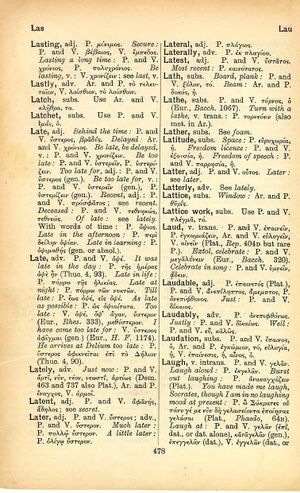laugh
ἐς δὲ τὰ ἔσχατα νουσήματα αἱ ἔσχαται θεραπεῖαι ἐς ἀκριβείην, κράτισται → for extreme diseases, extreme methods of cure, as to restriction, are most suitable (Corpus Hippocraticum, Aphorisms 1.6.2)
English > Greek (Woodhouse)
v. intrans.
P. and V. γελᾶν.
laugh aloud: P. ἐκγελᾶν.
burst out laughing: P. ἀνακαγχάζειν (Plat.).
you have made me laugh, Socrates, though I am in no laughing mood at present: P. ὦ Σώκρατες οὐ πάνυ γέ με νῦν δὴ γελασείοντα ἐποίησας γελάσαι (Plat., Phaedo, 64B).
laugh at: P. and V. γελᾶν (ἐπί, dat., or dat. alone), καταγελᾶν (gen.), ἐπεγγελᾶν (dat.), V. ἐγγελᾶν (dat., or κατά, gen.), διαγελᾶν (acc.).
mock: P. and V. σκώπτειν (acc.) (Eur., Cycl. 675 absol.), Ar. and P. χλευάζειν (acc.), ἐπισκώπτειν (acc.), V. κερτομεῖν (acc.); see mock.
simplicity was laughed down and disappeared: P. τὸ εὔηθες . . . καταγελασθὲν ἠφανίσθη (Thuc. 3, 83).
without laughing: use adv., P. ἀγελαστί.

